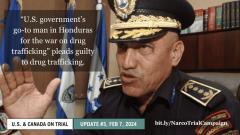
Five days until the criminal trial starts on February 12 in New York against former Honduran president Juan Orlando Hernández (JOH).
But it’s also very much a trial about 13 years of U.S. and Canadian support for and “justifications” of a repressive, corrupt, drug-trafficking regime, calling it a “democratic allie” the entire time.
Plea Deals: From Three to One Defendant. JOH Goes to Trial Alone
On February 2nd, former President Juan Orlando Hernández’s (JOH) co-accused Mauricio Hernández Pineda (MHP) accepted a deal with U.S. prosecutors, pleading guilty to conspiring to import cocaine into the U.S.
On February 6th, Juan Carlos “El Tigre” Bonilla also plead guilty to conspiring to import cocaine into the U.S. It is difficult to know at this point whether one or both men might testify against JOH in the trial next week. Stay tuned!
U.S.’s Go-To Policemen. Two High-level Officers, Two Drug Traffickers
MHP is a former high-level Honduran police officer. He also happens to be JOH’s cousin, although on several occasions JOH and his attorneys have denied such a relation. Pineda was a key ‘go-to’ guy for JOH and convicted drug trafficker, Tony Hernández. Tony is JOH’s brother, and former president of the Honduran Congress, during the years the U.S. and Canada maintained full relations with the “democratic” government of Honduras.
MHP used his position inside the Honduran police to personally escort and give protection to massive drug shipments and provide important information regarding police check points and routes to other allied drug traffickers (JOH, Tony Hernández, Joaquín Guzman “El Chapo”, etc).
MHP received bribes in exchange for the information he provided and the shipments he protected. He also enlisted other Honduran police officers to assist him.
Similarly, Juan Carlos “El Tigre” Bonilla, a long-standing controversial figure, was the head of the Honduran National Police in 2012-2013, a Regional Police Chief in a critical drug transit area in western Honduras and a member of the Honduran police since approximately 1998. Like MHP, Bonilla helped to traffic drugs and use his position in the police to murder enemies of his drug bosses like JOH.
This allegation does not seem too far off of accusations made against Bonilla in the early 2000s, when he was investigated and charged for involvement in death squads and forced disappearances of Honduran youth, while a member of the Honduran police.
Bonilla’s dark and violent history did not seem to persuade the U.S. to suspend police aid to Honduras when Bonilla was appointed as head of the law enforcement institution. The U.S. was also not persuaded when in 2014 when Honduran journalist David Romero read a testimony on his radio show on Radio Globo that placed Bonilla at the center of police death squads involved in rape, torture, and murder of drug-related enemies.
According to the Associated Press (AP) and Bonilla himself, Bonilla was the U.S. government’s go-to man in Honduras for the war on drug trafficking as the head of police in Honduras. As the AP reported over 10 years ago, Bonilla would ask for assistance from the U.S. Embassy to carry out his police duties. He bragged to the AP that he could tap people’s phones to locate possible drug traffickers by asking the U.S. Embassy for help. As the AP wrote:
“Throughout the afternoon and evening, Bonilla returned frequently to the support he receives from the U.S. Embassy for police operations. In one case, he ordered a subordinate to track a police commander with possible ties to drug traffickers. “I want to know where he is now. Find their phones and tap them. I will ask the Embassy for help,” he said.”
When questioned about their relationship to Bonilla, the State Department said it would conduct its own investigation, writing to the AP that it was “’carefully limiting assistance to special Honduran law enforcement units … not under Bonilla’s supervision.”
How could the U.S. have limited its security assistance in 2012-2013 to specific police units in Honduras when Bonilla was head of the institution?
‘Putting the U.S. and Canada On Trial’
The ‘Putting the U.S. and Canada On Trial’ campaign demands Congressional and Parliamentary inquiries and investigations into the U.S. and Canadian roles in funding, training, and coordination with state security forces and representatives like Bonilla, Mauricio Hernández Pineda, and others accused of drug trafficking and having ties with organized crime, over the course of the almost 13 years that the “democratic allie” regime was in power.
Additional reading
- Read the full Associated Press report cited extensively in this article titled ‘AP Exclusive: Honduras chief denies death squads’ here.
- Read U.S. historian Dana Frank’s article ‘The Thugocracy Next Door’ about Bonilla and U.S. support (and contradictions) for Bonilla here.
- Read Karen Spring’s blog post Bonilla’s dark past here.
Relevant U.S. court documents
- Read Mauricio Hernández Pineda’s indictment.
- Juan Carlos Bonilla’s indictment.
To follow and support the campaign
We are campaigning to hold the U.S. and Canada responsible for supporting the Honduran narco-state as former President Juan Orlando Hernández & police officers go to trial in New York on February 2024 (pending any further date changes).
- Read Update #1: U.S. and Canadian support for the coup: Creating the conditions for the construction of a narco-state
- Read Update #2: Trial date change. The campaign continues.
Facebook: Honduras Solidarity Network & Honduras Now
X (formerly Twitter): @Hondurassol @HondurasNow
Instagram: @HondurasNow
Web: Bit.ly/NarcoTrialCampaign
Contact: karen@hondurasnow.org & honsolnetwork@gmail.com
To donate: hondurasnow.org/donate
